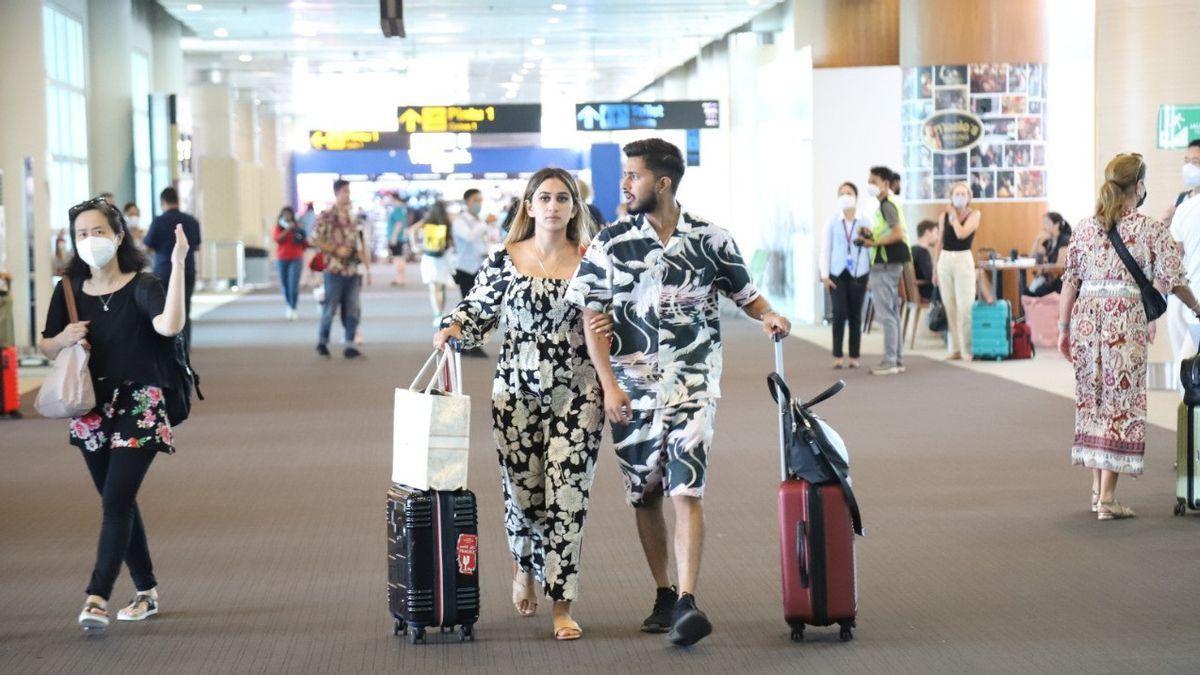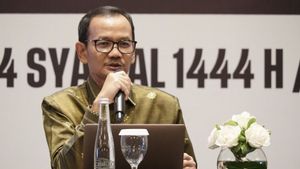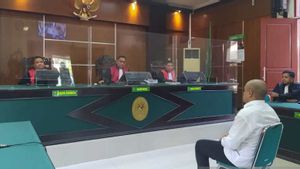Immigration in Bali began distributing cards containing a list of prohibitions and obligations (do's and don't'ts) while on the Island of the Gods to foreign tourists when they arrived at I Gusti Ngurah Rai International Airport, Badung Regency.
"Immediately report to the immigration ranks if there is disgraceful behavior of foreign nationals," said Head of the Bali Province Regional Office of the Ministry of Law and Human Rights (Kemenkumham) Anggiat Napitupulu in Denpasar, quoted by ANTARA, Thursday, June 8.
In the early stages, immigration printed and distributed as many as 1,000 cards which contained 12 obligations and eight restrictions while in Bali.
A total of 48 immigration officers were involved in distributing prohibited cards and obligations for foreign tourists.
The pocket card was tucked in an international passenger passport when they finished checking their identity and got an immigration stamp.
The writing listed on the red card in the first stage uses English by containing shorter and denser messages.
After that, it will also be printed in four other languages, namely Russia, India, Mandarin, and Japan.
This effort, said Anggiat Napitupulu, was to provide understanding to foreign tourists regarding the laws and norms that apply in Bali, following the large number of foreign tourists who commit disgraceful acts.
"We also ask for the support of the local government, officers who are members of the surveillance team of foreigners and the community to jointly supervise the presence and behavior of foreigners living in villas or homestays," he added.
The prohibition and obligations, he said, are in accordance with the Circular Letter (SE) of the Governor of Bali Number 4 of 2023 concerning New Order for foreign tourists while in Bali.
The following is the obligation and prohibition for foreign tourists when in Bali according to the SE Governor of Bali Number 4 of 2023.
Obligations:
1. Melakukan kolasitaan maupun symbol-symbol keagamaan yang murah.
2. Respect the customs, traditions, arts and culture, as well as local wisdom of the Balinese people.
3. Wear polite, reasonable, and appropriate clothes during visits to sacred areas, tourist attractions, public places, and during activities in Bali.
4. Polite behavior in sacred areas, tourist areas, restaurants, shopping areas, roads, and other public places.
5. Accompanied by tour guides who have permission/licency (understanding natural conditions, customs, traditions, and local wisdom of the Balinese people) while visiting tourist attractions.
6. Exchange of foreign currencies at the organizers of the official foreign exchange business (KUPVA), both bank and non-bank, was marked by the existence of a QR code license number and logo from Bank Indonesia.
7. Make payments using the Indonesian Standard QR Code.
8. Make transactions using rupiah currency.
9. Driving by complying with applicable laws and regulations in Indonesia, among others, has a valid international or national driving license, orderly traffic on the road, dressed politely, wearing helmets, following traffic signs, not loading passengers exceeding capacity, and not under the influence of alcoholic beverages and/or illegal drugs.
10. Using an official four-wheeled transportation device or two-wheeled transportation device under a business entity or two-wheeled transportation rental association.
11. Stay/stay at the accommodation business place that has a permit in accordance with the provisions of the legislation.
12. Obey all special provisions/rules that apply in each tourist attraction and tourism activities.
SEE ALSO:
Ban:
1. Entering the main (utaming) and middle (madya) holy places or places that are polluted such as temples, pelinggih, except for prayer purposes by wearing Balinese traditional clothing or prayer and not in the coming months (menstruation).
2. Climb the sacred tree.
3. Acting that tarnishes holy places and tarnished places, temples, pratima (sacred temples) and religious symbols, such as climbing a holy building and taking pictures in disrespectful clothes/without clothes.
4. Disposal of garbage carelessly and littering lakes, springs, rivers, seas, and public places.
5. Using disposable plastics such as plastic bags, polysterina (styrofoam) and plastic straws.
6. Speak harsh words, behave disrespectfully, make noise, and act aggressively against state officials, the government, local communities, and fellow tourists directly or indirectly through social media, such as spreading hate speech (hate speech) and hoaxes.
7. Work and/or carry out business activities without having official documents issued by the authorized agency.
8. Involved in illegal activities such as (floras and fauna, cultural artifacts, sacred objects) buying and selling illegal goods, including illegal drugs.
The English, Chinese, Japanese, Arabic, and French versions are automatically generated by the AI. So there may still be inaccuracies in translating, please always see Indonesian as our main language. (system supported by DigitalSiber.id)



















